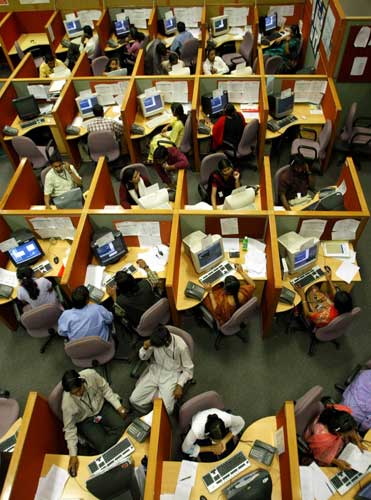Call centre Romeos threaten India's fight against Aids
Cramped conditions and overnight working offer young employees opportunities for casual se

A new breed of "call centre Romeos", seducing women as they work long night shifts together, has been identified as the latest threat in India's battle against the spread of Aids.
In recent years, telephone call centres have emerged as a symbol of the new, modernised India. Educated, English-speaking young people earn salaries unimaginable to their parents as they deal with customers and clients on the other side of the world. Equally unimaginable to the older generation are the opportunities for casual sex afforded by working overnight in the cramped conditions of many call centres. But for all their schooling and seemingly modern ways, many of these young people have little education about the danger of Aids and the way the HIV virus is spread, experts say.
"Men and women are entering the workplace for the first time," said Dr Suniti Solomon, who runs an Aids clinic in the southern city of Chennai. "Often they are coming from outside the urban areas. They are getting a good salary, it's a nice atmosphere. They are away from their parents and have more freedom."
Dr Solomon, who detected India's first Aids case in 1986, added: "Ten years ago, we had no call centres. The high-risk groups were truckers and sex workers, so we targeted these groups and the rates of condom use went up. Now the face of Aids is changing, and the risk groups are changing."
The UN estimates that up to 2.5 million people in India are infected with HIV or have Aids. It is unknown how many of the country's estimated 1.3 million call centre workers are infected, but anecdotal evidence suggests that increasing numbers are leaving themselves open to infection. Dr Solomon said three or four call centre workers visited her clinic every week to be tested for HIV, because they were concerned after having unprotected sex.
In some cities, condom machines are to be installed in call centres, alongside the machines for coffee and snacks. Aids prevention campaigners in Mumbai are to put condom dispensers in more than 3,000 locations over the coming months, including call centres.
"We don't want to say that they are irresponsible," said Dr Harish Pathak, one of the campaigners. "But more than 80 per cent of HIV spreads through sex, and young adults are definitely more susceptible to it."
One female call centre worker complained to The Times of India that condom machines would damage the reputation of the centres and make parents more reluctant to let their daughters take jobs in them. Busy routines and strict rules of conduct prevented misbehaviour, she claimed.
However rapidly some sections of Indian society may be changing, conservative attitudes still dominate, and are hampering the fight against Aids, experts claim. Dr Solomon said an example was Hindu activists' opposition to circumcision – proven to help prevent HIV transmission – on the grounds that it was non-traditional. A recent government study seeking to gauge acceptance of circumcision set off an angry backlash by Hindu fundamentalists, who called it "obnoxious".
"I have sons who are now in their 20s," said Dr Solomon. "I never shied away from talking to them about sex education. Our aim has to be to make sure they do not get HIV."
Join our commenting forum
Join thought-provoking conversations, follow other Independent readers and see their replies
Comments
Bookmark popover
Removed from bookmarks